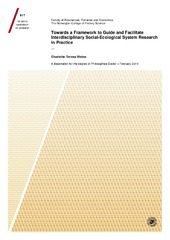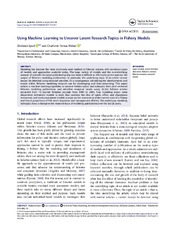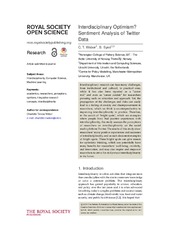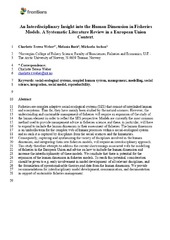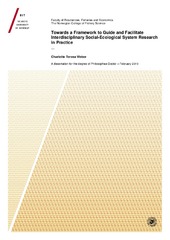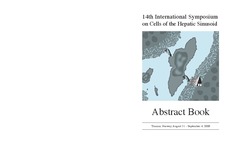| dc.contributor.advisor | Borit, Melania | |
| dc.contributor.author | Weber, Charlotte Teresa | |
| dc.date.accessioned | 2019-04-30T07:54:00Z | |
| dc.date.available | 2019-04-30T07:54:00Z | |
| dc.date.issued | 2019-06-27 | |
| dc.description.abstract | Social-ecological systems (SES) consist of a social and an ecological system that are linked through a complex interplay of social and ecological processes. SES can be studied through SES research, which has become increasingly important because it is thought that it can potentially address and solve many societal challenges, such as climate change, resource scarcity, and habitat degradation. SES research investigates the relationships between social and ecological conditions, interactions, and outcomes, and requires an integrative, i.e. interdisciplinary or transdisciplinary approach because one discipline alone cannot study the complex interactions within SES. This makes SES research particularly challenging and practical real-world barriers continue to hinder integration and progress in the field. Yet, the challenges and practical barriers for interdisciplinary SES research have hardly been explored, while practical guidance on how to conduct SES research is generally lacking.
As a first step to explore interdisciplinary SES research practices, a preliminary study is conducted with the aim to develop a framework that can guide researchers on how to conduct interdisciplinary SES research in practice. A preliminary framework is developed through a review and synthesis of various strands of literature and empirical experiences.
The framework provides ten design principles to guide the different phases of the interdisciplinary SES research process: the orientation phase - for problem identification, the preparation phase - for identifying relevant disciplines and team members, and the analysis and integration phase - for analysis, integration, and knowledge production. In addition, common practical challenges when implementing each of the design principles are outlined, while suggestions for practical coping strategies are provided to prevent or overcome these challenges. Three selected coping strategies proposed by the framework are demonstrated through practical examples, showing the application in practice of a particular methodology suitable to implement the respective coping strategy.
The preliminary framework could be applied by different users for various purposes, but its main intent is to make the SES research process easier on a practical level. The framework serves as a first step towards guiding and facilitating interdisciplinary SES research, from where an adjustment of the framework through co-creation with potential users or an expansion of the framework to guide transdisciplinary SES research, can be potential avenues for future research. | en_US |
| dc.description.doctoraltype | ph.d. | en_US |
| dc.description.popularabstract | In social-ecological systems (SES), humans are connected with nature through their interactions with one another. These interactions can sometimes result in societal challenges, such as climate change or natural resource degradation. To study and solve these challenges, researchers investigate human-nature interactions through SES research, which can be very challenging. This study aims to guide and facilitate SES research by trying to make the practical process of conducting this research easier. To do so, the study develops a framework with guiding principles that can help researchers on how to do this research. The framework also provides coping strategies that can help researchers to prevent or overcome practical problems before and during conducting the research. With the help of this framework, it is hoped that SES research can be easier and that more societal challenges will be addressed. | en_US |
| dc.identifier.isbn | 978-82-8266-168-3 | |
| dc.identifier.uri | https://hdl.handle.net/10037/15238 | |
| dc.language.iso | eng | en_US |
| dc.publisher | UiT The Arctic University of Norway | en_US |
| dc.publisher | UiT Norges arktiske universitet | en_US |
| dc.relation.haspart | <p>This thesis is based on the following papers:
<p>Paper I: Syed, S. & Weber, C.T. (2018). Using Machine Learning to Uncover Latent Research Topics in Fishery Models. <i>Reviews in Fisheries Science & Aquaculture, 26</i>(3), 319-336. Also available at <a href=https://hdl.handle.net/10037/14452> https://hdl.handle.net/10037/14452</a>.
<p>Paper II: Weber, C.T. & Syed, S. Interdisciplinary Optimism? Sentiment Analysis of Twitter Data. (Submitted manuscript).
<p>Paper III: Weber, C.T., Borit, M. & Aschan, M. An Interdisciplinary Insight into the Human Dimension in Fisheries Models. A Systematic Literature Review in a European Union Context. (Submitted manuscript). | en_US |
| dc.relation.projectID | info:eu-repo/grantAgreement/EC/H2020/642080/EU/Social Science Aspects of Fisheries for the 21st Century/SAF21/ | en_US |
| dc.rights.accessRights | openAccess | en_US |
| dc.rights.holder | Copyright 2019 The Author(s) | |
| dc.rights.uri | https://creativecommons.org/licenses/by-nc-sa/3.0 | en_US |
| dc.rights | Attribution-NonCommercial-ShareAlike 3.0 Unported (CC BY-NC-SA 3.0) | en_US |
| dc.subject | VDP::Agriculture and fishery disciplines: 900::Agriculture disciplines: 910::Management of natural resources: 914 | en_US |
| dc.subject | VDP::Landbruks- og Fiskerifag: 900::Landbruksfag: 910::Naturressursforvaltning: 914 | en_US |
| dc.subject | VDP::Humanities: 000::Philosophical disciplines: 160::Other philosophical disciplines: 169 | en_US |
| dc.subject | VDP::Humaniora: 000::Filosofiske fag: 160::Andre filosofiske fag: 169 | en_US |
| dc.subject | VDP::Agriculture and fishery disciplines: 900::Fisheries science: 920::Other fisheries disciplines: 929 | en_US |
| dc.subject | VDP::Landbruks- og Fiskerifag: 900::Fiskerifag: 920::Andre fiskerifag: 929 | en_US |
| dc.title | Towards a framework to guide and facilitate interdisciplinary social-ecological system research in practice. | en_US |
| dc.type | Doctoral thesis | en_US |
| dc.type | Doktorgradsavhandling | en_US |


 English
English norsk
norsk